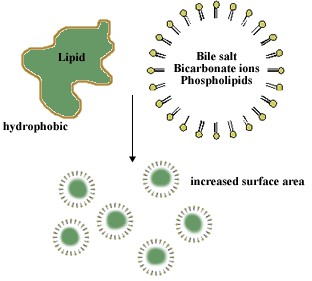In designing professional quality dietary supplements and functional foods, utilizing the purist and most potent ingredients feasible is certainly desirable. However, it is also important to consider the bioavailability of the ingredients.
Overview of Fat Digestion
Lipids (fats and oils) are hydrophobic, which means they are insoluble in the watery medium of the small intestine. Indeed, lipids tend to coalesce into larger droplets. Such aggregation of droplets reduces the surface area available for digestion by lipases, the fat-digesting enzymes. The large hydrophobic lipid globule on the left in the diagram below [Figure 1] is only accessible to the water-soluble lipases at the surface interface between lipid and water. To increase the access and rate of lipid digestion, the lipid droplet must be broken up in order to increase the surface area exposed to the fat-digesting enzymes.1
"Pre-Digestion" of Fats via Emulsification of Lipids
Bile salts secreted from the liver,via the gallbladder have a combination of lipophilic (fat loving) and hydrophilic (water loving) regions. Such a dual structure gives bile acids a detergent action on globules of dietary fat, which causes fat globules to break down into minute, microscopic droplets. This breaking down of large aggregates of fat globules into very small droplets is called emulsification. Emulsification is not digestion, per se, but is of vital importance because it greatly increases the surface area of fat available for digestion by lipases, which could not access enough surface area if the lipids were still coalesced in larger globules.2
Enhancing Absorption of Fish Oil
 The large hydrophobic lipid globule on the left is only accessible to the water-soluble lipases at the surface interface between lipid and water. To increase the access and rate of lipid digestion, the lipid droplet must be broken up in order to increase the surface area exposed to the fat-digesting enzymes.
Various studies have demonstrated that emulsifying fish oil significantly increases the blood levels of EPA and DHA as compared to equal amounts of regular fish oil. The authors of a study published in the June 2009 issue of the Journal of the American Dietetic Association concluded: "[O]ur findings indicate that a single dose of emulsified fish oil resulted in enhanced absorption of total n-3 eicosapentaenoic acid (EPA) and docosahexaenoic acid (DHA) ... compared with the capsular triglyceride fish oil."3 And authors of a study published in the Nutrition Journal (2007) concluded, "Pre-emulsification of an oil mixture prior to ingestion increases the absorption of longer chain more highly unsaturated fatty acids (especially eicosapentaenoic acid and docosahexaenoic acid) but does not affect absorption of shorter chain less saturated fatty acids, suggesting that pre-emulsification of fish oils may be a useful means of boosting absorption of these beneficial fatty acids."4
The large hydrophobic lipid globule on the left is only accessible to the water-soluble lipases at the surface interface between lipid and water. To increase the access and rate of lipid digestion, the lipid droplet must be broken up in order to increase the surface area exposed to the fat-digesting enzymes.
Various studies have demonstrated that emulsifying fish oil significantly increases the blood levels of EPA and DHA as compared to equal amounts of regular fish oil. The authors of a study published in the June 2009 issue of the Journal of the American Dietetic Association concluded: "[O]ur findings indicate that a single dose of emulsified fish oil resulted in enhanced absorption of total n-3 eicosapentaenoic acid (EPA) and docosahexaenoic acid (DHA) ... compared with the capsular triglyceride fish oil."3 And authors of a study published in the Nutrition Journal (2007) concluded, "Pre-emulsification of an oil mixture prior to ingestion increases the absorption of longer chain more highly unsaturated fatty acids (especially eicosapentaenoic acid and docosahexaenoic acid) but does not affect absorption of shorter chain less saturated fatty acids, suggesting that pre-emulsification of fish oils may be a useful means of boosting absorption of these beneficial fatty acids."4
A significant new, though yet unpublished, pilot study on fish oil and bioavailability was conducted by researchers at the Essential Health Clinic in Glasgow, Scotland. Blood analysis was performed by Stirling University in Scotland. The crossover study examined and compared the bioavailability of an emulsified fish oil supplement to conventional liquid fish oil in healthy adults, using blood samples taken every hour for five hours. The total percentage of omega-3 phospholipids in the plasma as a result of the emulsified fish oil was 10 times greater than that of the reference fish oil.
It should be noted that these results may reflect as much the speed at which emulsified fish oil is absorbed, as compared to the longer term actual total amount absorbed over time. Nonetheless, Dr. Tom Gilhooly, who headed the research team, admits the results were so extraordinary that a larger, peer-reviewed study is definitely merited.
As pre-emulsification of fish oil supplements enhances lipid absorption in healthy individuals, it is therefore likely that most of us, even if healthy, do not optimally emulsify the fats we eat. The implications for those with compromised fat digestion from sub- optimal liver, gallbladder or pancreatic function, whether from disease, medication or surgery, is that such increased bioavailability should be of even greater benefit.
Additionally, for optimal absorption any lipid-based supplement should be consumed with a relatively fatty meal. Otherwise, bile acid and lipase release are not stimulated, thereby minimizing their release and decreasing fat absorption. With emulsified oil supplements being "predigested," such timing with a fatty meal is of much less import.
Another Benefit of Emulsification
Quoting the authors of the Journal of the American Dietetic Association study mentioned previously, "Oral fish oil supplements are an alternative means of consuming adequate long-chain n-3 fatty acids in individuals who do not consume sufficient dietary sources. However, palatability can present a problem with compliance. Emulsifying fish oil allows for production of a pleasant-tasting supplement and can enhance digestion and absorption of the fatty acids."3 And the Nutrition Journal researchers quoted previously have this to say: "The health benefits of increased intakes of omega-3 fatty acids are well established but palatability often presents a problem. The process of emulsification is used in the food industry to provide a wider spectrum of use, often with the result of increased consumption."4
Emulsification lends a creamy, smooth texture to fish oil, as compared to the greasy or oily texture of regular fish oil, leading to greater compliance, especially if properly flavored. Also, being "pre-digested," emulsified fish oil should not elicit the infamous "fish burps" some people experience. Indeed, such "burp backs" may be a sign of sub-optimal gallbladder liver function.
References
- For fuller presentation and more diagrams, see www.click4biology.info/c4b/H/H2.htm, provided by John Burrell, science teacher and biology coordinator at Bangkok Patana School in Thailand, who gave us kind permission to reproduce his diagram.
- "Pathophysiology of the Digestive System, Secretion of Bile and the Role of Bile Acids in Digestion." Colorado State University: www.vivo.colostate.edu/hbooks/pathphys/digestion/liver/bile.html
- Raatz SK, Redmon JB, Wimmergren N, Donadio JV, Bibus DM. Enhanced absorption of n-3 fatty acids from emulsified compared with encapsulated fish oil. J Am Diet Assoc, 2009 Jun;109(6):1076-81.
- Garaiova I, Guschina IA, Plummer SF, Tang J, Wang D, Plummer NT. A randomised cross-over trial in healthy adults indicating improved absorption of omega-3 fatty acids by pre-emulsification. Nutr J, 2007 Jan 25;6:4.
Click here for previous articles by John Maher, DC, DCBCN, BCIM.





